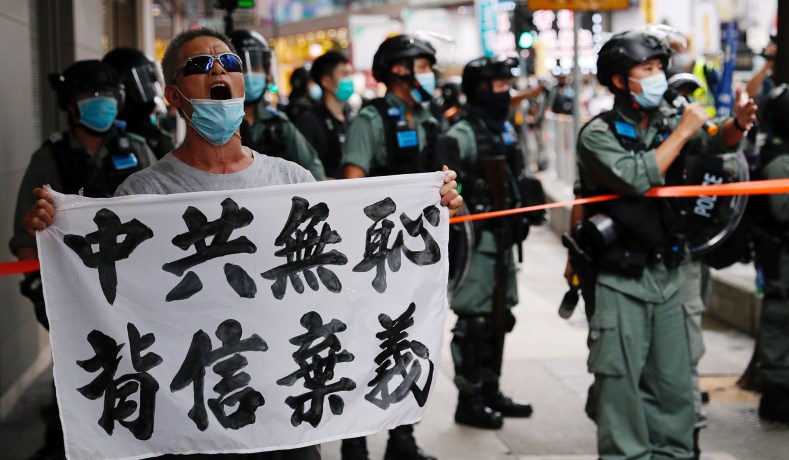
Chinese diplomats and spokespeople say that the new security law implemented in Hong Kong last week is simply a national-security measure that all countries have the right to implement. Of course, like so much else of what the Chinese Communist Party says, this is a lie.
Here’s what Zhao Lijian, a foreign ministry spokesperson, told reporters last week:
Every sovereign state has the inherent right to legislate in the interest of its national security. Establishing and improving the legal system and enforcement mechanisms for safeguarding national security in [Hong Kong] at the state level by the [National People’s Congress] in accordance with the Constitution and the Basic Law is a necessary step to plug loopholes in the [Hong Kong] national security legislation and uphold national sovereignty and security and a fundamental solution to ensure the steady and successful implementation of the “one country, two systems”.
Sovereign states do in fact have the right to legislate with national security in mind — but Zhao’s rhetorical sleight of hand papers over the notion that this should not impede the exercise of basic human rights, as the new security law in Hong Kong does. Already, Hong Kong authorities have moved to take books by pro-democracy activists off the shelves, ban certain protest slogans and symbols (including the blank sheets of paper adopted by some people in response), and regulate online posts made about the situation in the city.
In addition to that, though, the CCP’s appeals to sovereignty ring hollow when viewed in contrast with what Chinese diplomats are saying to foreign governments that have changed their policies toward Hong Kong in the wake of the national-security law’s promulgation.
The Canadian government last week suspended its extradition treaty with Hong Kong, ended the export of military equipment to the city, and issued a warning to Canadian citizens with plans to travel there. This last item stands out: Canadian citizens Michael Kovrig and Michael Spavor were arrested by Chinese authorities in 2018 in retaliation for the arrest of Huawei CFO Meng Wanzhou in Vancouver. It remains a sore point in the deteriorating relationship between the two countries. The travel warning, given Beijing’s history of arbitrarily detaining Canadian citizens, is a sensible measure.
However, unsurprisingly, Beijing voiced its objections to Canada’s response to the national-security law. Here’s Zhao again :
The Canadian side has seriously violated international law and basic norms governing international relations, and grossly interfered in China’s internal affairs. China strongly condemns that and reserves the right to further react. Canada will bear all the consequences arising therefrom…[Emphasis mine]
China urges the Canadian side to immediately correct its mistakes and stop interfering in Hong Kong affairs and China’s other internal affairs in any way so as to avoid further damage to China-Canada relations.
A spokesperson for the Chinese government, while in the same briefing making an argument against foreign interference in Hong Kong’s affairs, suggests that his government will punish Canada for taking steps squarely within its own rights as a sovereign country. This line of argument is as incoherent as it is thuggish. Beijing is not guaranteed extradition agreements with foreign countries; likewise exports of military equipment and Canadian tourism and business activity are not some sort of right to which it is entitled.
And it’s not just Canada. The United Kingdom recently offered a path to citizenship for the 3 million Hong Kong residents in possession of a special passport. China’s ambassador to the U.K., Liu Xiaoming, called the move “gross interference” during a press conference. Commenting on reports that the British government is also re-considering whether to grant Huawei a role in the country’s 5G rollout, Liu also said this:
We want to be your friend. We want to be your partner. But if you want to make China a hostile country, you will have to bear the consequences.
Common sense would say that decisions about a country’s immigration policies and telecommunications infrastructure should rest with that country’s government. Not according to the Chinese Communist Party, which for decades has stressed principles of national sovereignty and non-interference in its foreign policy.
However, at this particular moment — as international concern about Hong Kong and the genocide of the Uighurs mounts — the CCP has revealed its global ambitions in a particularly striking way. CCP officials protest supposed violations of China’s sovereignty that do not actually violate its sovereignty. In so doing, they attempt to deter states from exercising powers squarely within their rights as sovereign countries.
The CCP’s talk about foreign interference has long been hollow — but now the world truly gets a sense for how it uses this rhetoric to go on the offensive.
Something to Consider
If you enjoyed this article, we have a proposition for you: Join NRPLUS. Members get all of our content (including the magazine), no paywalls or content meters, an advertising-minimal experience, and unique access to our writers and editors (conference calls, social-media groups, etc.). And importantly, NRPLUS members help keep NR going. Consider it?
If you enjoyed this article, and were stimulated by its contents, we have a proposition for you: Join NRPLUS.








_2.jpg?fit=60,30&ssl=1)